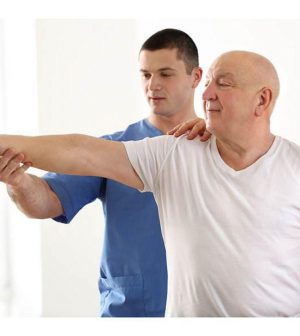- Recognizing the Signs of Hypothyroidism
- 10 Strategies to Overcome Insomnia
- Could Artificial Sweeteners Be Aging the Brain Faster?
- Techniques for Soothing Your Nervous System
- Does the Water in Your House Smell Funny? Here’s Why
- Can a Daily Dose of Apple Cider Vinegar Actually Aid Weight Loss?
- 6 Health Beverages That Can Actually Spike Your Blood Sugar
- Treatment Options for Social Anxiety Disorder
- Understanding the Connection Between Anxiety and Depression
- How Daily Prunes Can Influence Cholesterol and Inflammation
Are Adults With Cerebral Palsy Getting the Therapies They Need?

U.S. adults with cerebral palsy aren’t getting adequate physical therapy, according to a new study.
While they’re more likely than other adults in community-living situations to have debilitating pain from musculoskeletal disorders, those with cerebral palsy receive significantly less physical therapy, a Michigan Medicine-University of Michigan team found.
For the study, the researchers analyzed four years of Medicare claims from adults with and without cerebral palsy who had one or more ambulatory claims for a musculoskeletal issue.
Fewer than one-third of patients in the general population received physical therapy, and the rate was even lower among those with cerebral palsy, even though they’re at greater risk for secondary health conditions, the findings showed.
“The results are staggering, but they support our hypothesis that people with cerebral palsy receive inequitable health care,” said study co-author Mark Peterson, a professor of physical medicine and rehabilitation.
The findings were published recently in the journal Disability & Health.
“We know adults with cerebral palsy have musculoskeletal conditions that are far worse than the general population,” Peterson said in a university news release. “They need more, but they’re getting much less in terms of treatment.”
Cerebral palsy is the most common childhood-onset motor disability. It is often viewed as only affecting children, which is one reason why adults with cerebral palsy are misunderstood and not properly treated, according to Peterson.
“Children with cerebral palsy grow up, and the general population of medical providers need to be more aware that adults with cerebral palsy are at high risk for these musculoskeletal disorders,” he said.
In addition, Peterson noted that adults with cerebral palsy need more access to specialists.
“They ‘age out’ of specialty hospitals, and adult rehabilitation service providers don’t necessarily have the knowledge to ensure these patients receive high-value care,” he added.
The researchers said the study shows the need for greater awareness among health care providers, as well as better screening strategies and preventative health interventions.
More information
The March of Dimes has more on cerebral palsy.
SOURCE: Michigan Medicine-University of Michigan, news release, May 28, 2021
Source: HealthDay
Copyright © 2026 HealthDay. All rights reserved.










